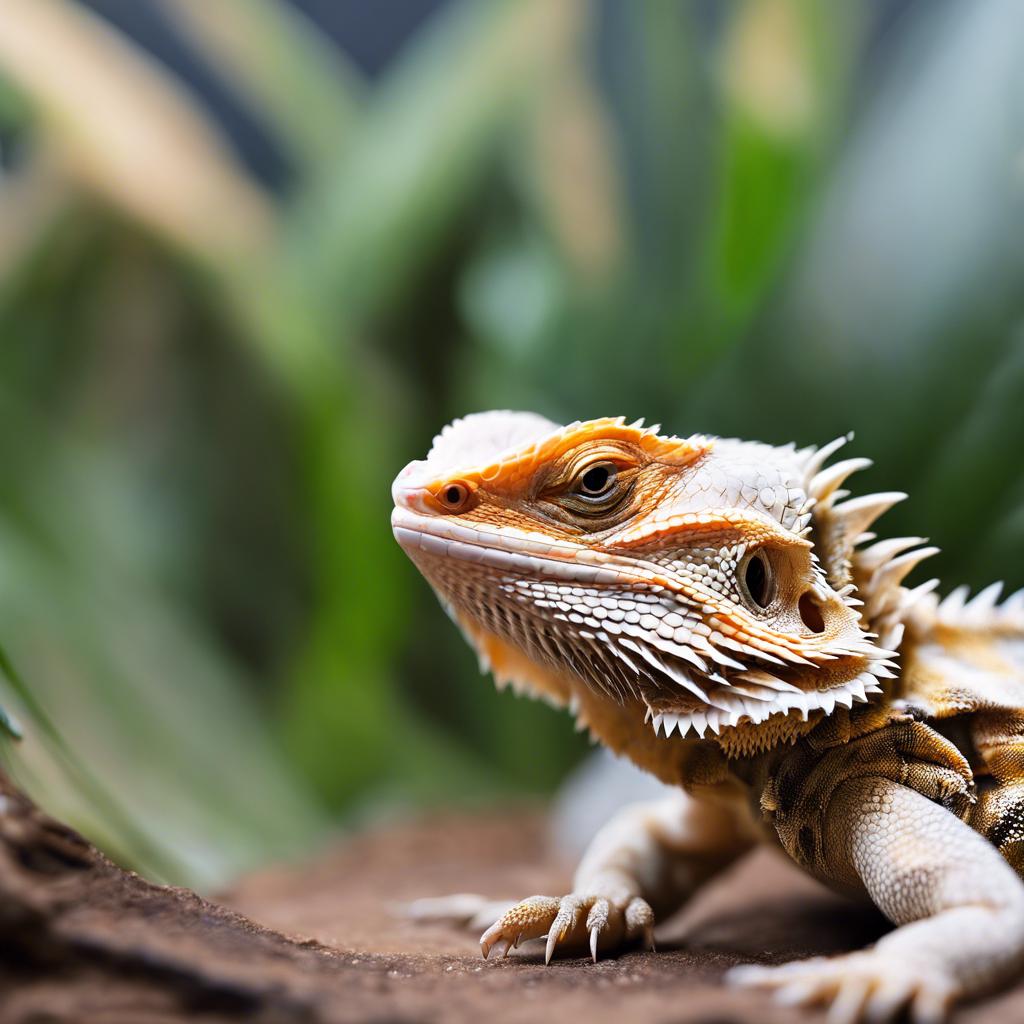Bearded dragons are popular reptile pets known for their unique appearance and docile nature. These reptiles are native to Australia and have become increasingly popular as pets due to their friendly demeanor and relatively low maintenance requirements. However, it is important to note that proper care and hydration are crucial for the health and well-being of bearded dragons.
One of the most important aspects of caring for a bearded dragon is ensuring they have access to clean water and are properly hydrated. Just like any other living creature, bearded dragons rely on water for their bodily functions and overall health. Without adequate hydration, they can suffer from a range of health issues, including dehydration.
Key Takeaways
- Bearded dragons require proper hydration to maintain their health and well-being.
- Signs of dehydration in bearded dragons include sunken eyes, wrinkled skin, and lethargy.
- Different ways to hydrate your bearded dragon include misting, soaking, and providing fresh water.
- Water quality and temperature are important factors in maintaining proper hydration levels for bearded dragons.
- A balanced diet and proper habitat setup can also contribute to your bearded dragon's hydration levels.
Understanding the Importance of Hydration for Bearded Dragons
Hydration is crucial for bearded dragons because water plays a vital role in their bodily functions. Water helps regulate their body temperature, aids in digestion, and supports overall organ function. It also helps keep their skin healthy and prevents dehydration, which can lead to serious health problems.
Bearded dragons are ectothermic animals, which means they rely on external sources of heat to regulate their body temperature. This makes them more susceptible to dehydration, as they can lose water through evaporation more quickly than endothermic animals. Therefore, it is essential to provide them with access to fresh water at all times.
Signs of Dehydration in Bearded Dragons
Recognizing the signs of dehydration in bearded dragons is crucial for their well-being. Some common symptoms include sunken eyes, wrinkled skin, lethargy, loss of appetite, and dark-colored urine. If you notice any of these signs in your bearded dragon, it is important to take immediate action to rehydrate them.
Dehydration can quickly become a serious health issue if left untreated. It can lead to organ failure, metabolic bone disease, and even death. Therefore, it is essential to recognize the signs of dehydration early on and take the necessary steps to address it.
Different Ways to Hydrate Your Bearded Dragon
There are several methods you can use to provide water to your bearded dragon. The most common method is to offer a shallow dish of fresh water in their enclosure. This allows them to drink whenever they feel the need to hydrate themselves. However, it is important to ensure that the water is clean and free from any contaminants.
Another method is to mist your bearded dragon with water using a spray bottle. This can help increase humidity levels in their enclosure and provide them with an opportunity to drink droplets of water from their skin. Misting is especially beneficial for bearded dragons that are not drinking from a dish.
Additionally, you can offer your bearded dragon water-rich foods such as fruits and vegetables. This not only provides them with hydration but also adds variety to their diet. However, it is important to research which foods are safe for bearded dragons and avoid those that may be harmful.
The Importance of Water Quality and Temperature for Bearded Dragons
In addition to providing water, it is important to consider the quality and temperature of the water you offer your bearded dragon. Bearded dragons are sensitive to chemicals and contaminants in their water, so it is crucial to use filtered or bottled water that is free from chlorine and other harmful substances.
The temperature of the water is also important, as bearded dragons prefer warm water. The ideal temperature range for their drinking water is between 85-95 degrees Fahrenheit (29-35 degrees Celsius). This ensures that they are more likely to drink and stay hydrated.
To maintain proper water conditions, it is recommended to change the water in their dish daily and clean the dish regularly to prevent bacterial growth. Additionally, you should monitor the temperature of the water using a thermometer to ensure it remains within the appropriate range.
The Role of Diet in Hydrating Your Bearded Dragon

Diet plays a significant role in the hydration levels of bearded dragons. Feeding them water-rich foods can help supplement their water intake and keep them hydrated. Some examples of water-rich foods that are safe for bearded dragons include cucumbers, melons, and leafy greens.
It is important to note that while fruits can provide hydration, they should be fed in moderation due to their high sugar content. Leafy greens, on the other hand, are a great source of hydration and should make up the majority of your bearded dragon's diet.
In addition to providing water-rich foods, it is important to ensure that your bearded dragon's diet is well-balanced and includes a variety of nutrients. This will help support their overall health and hydration levels.
Creating a Proper Habitat for Bearded Dragons to Stay Hydrated
Creating a proper habitat for your bearded dragon is essential for promoting hydration. Bearded dragons require a humid environment to maintain proper hydration levels, as they can lose moisture through their skin and respiratory system.
To create a humid environment, you can use a reptile fogger or misting system to increase humidity levels in their enclosure. It is also important to provide a proper substrate that can retain moisture, such as reptile carpet or coconut fiber bedding.
Additionally, you should provide hiding spots and basking areas in their enclosure to allow them to regulate their body temperature and stay hydrated. These areas should have access to fresh water and be easily accessible for your bearded dragon.
Common Health Issues Related to Dehydration in Bearded Dragons
Dehydration can lead to several health issues in bearded dragons if left untreated. One common problem is metabolic bone disease, which occurs when there is a lack of calcium in their diet. Dehydration can also lead to kidney problems, digestive issues, and respiratory infections.
To prevent these health issues, it is important to ensure that your bearded dragon is properly hydrated at all times. Regularly monitor their water intake and behavior to ensure they are drinking enough and showing no signs of dehydration.
Tips for Maintaining Proper Hydration Levels in Bearded Dragons
To maintain proper hydration levels in your bearded dragon, here are some practical tips to follow:
1. Provide fresh water in a shallow dish at all times.
2. Mist your bearded dragon with water regularly to increase humidity levels.
3. Offer water-rich foods as part of their diet.
4. Use filtered or bottled water that is free from contaminants.
5. Monitor the temperature of the water to ensure it is within the appropriate range.
6. Clean the water dish regularly to prevent bacterial growth.
7. Create a humid environment in their enclosure using a reptile fogger or misting system.
8. Provide hiding spots and basking areas with access to fresh water.
By following these tips, you can help ensure that your bearded dragon remains properly hydrated and healthy.
The Importance of Consistent Care for Your Bearded Dragon's Health and Hydration.
In conclusion, proper care and hydration are essential for the health and well-being of bearded dragons. Water plays a vital role in their bodily functions and overall health, so it is important to provide them with access to clean water at all times.
Recognizing the signs of dehydration early on is crucial for preventing serious health issues. By providing various methods of hydration, maintaining proper water quality and temperature, offering a balanced diet, and creating a suitable habitat, you can help ensure that your bearded dragon remains hydrated and healthy.
Consistent care and attention to your bearded dragon's hydration needs are key to their overall health and well-being. By following the tips outlined in this article, you can provide the best possible care for your bearded dragon and help them thrive.
If you're looking for more information on how to properly hydrate your bearded dragon, you might find this article on Reptile Wizard helpful. They discuss the safety of using pothos plants in your bearded dragon's enclosure and provide tips on how to incorporate them effectively. Check it out here. Additionally, if you're curious about whether bearded dragons can eat black beans, Reptile Wizard has an informative article on that topic as well. You can read it here. Remember to always consult reliable sources when it comes to the care and nutrition of your beloved reptiles.
FAQs
What is a bearded dragon?
A bearded dragon is a type of lizard that is commonly kept as a pet. They are native to Australia and are known for their distinctive spiny “beard” under their chin.
Why is hydration important for bearded dragons?
Bearded dragons need to stay hydrated in order to maintain their overall health and well-being. Dehydration can lead to a variety of health problems, including kidney failure and digestive issues.
How can I tell if my bearded dragon is dehydrated?
Signs of dehydration in bearded dragons include sunken eyes, wrinkled skin, lethargy, and loss of appetite. If you suspect your bearded dragon is dehydrated, it's important to take action right away.
What are some ways to hydrate a bearded dragon?
There are several ways to hydrate a bearded dragon, including providing a shallow dish of water for them to drink from, misting them with water, and offering them water-rich foods like fruits and vegetables.
How often should I offer water to my bearded dragon?
Bearded dragons should have access to fresh water at all times. You should also mist them with water or offer them water-rich foods on a regular basis to ensure they are getting enough hydration.
Are there any foods I should avoid giving my bearded dragon?
Yes, there are certain foods that can be harmful to bearded dragons and should be avoided. These include spinach, rhubarb, avocado, and citrus fruits.

